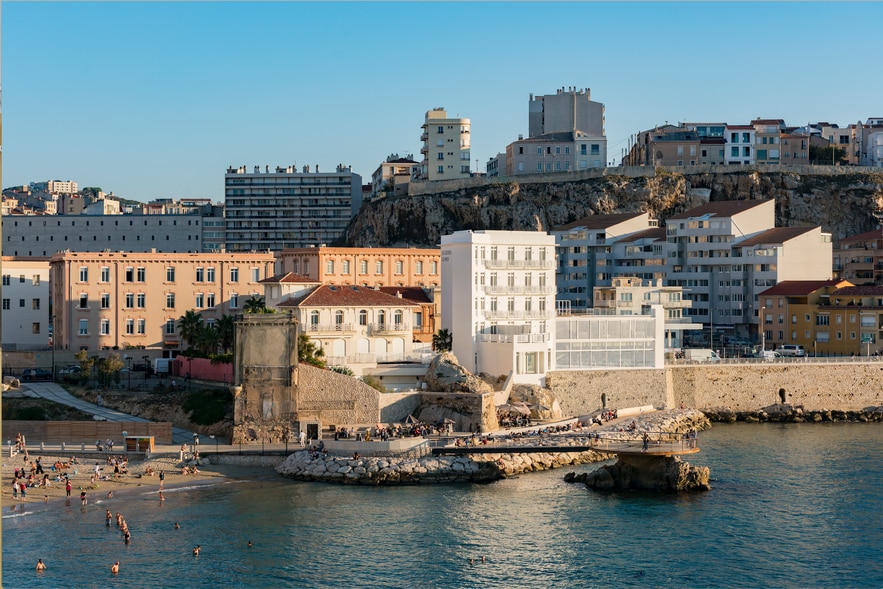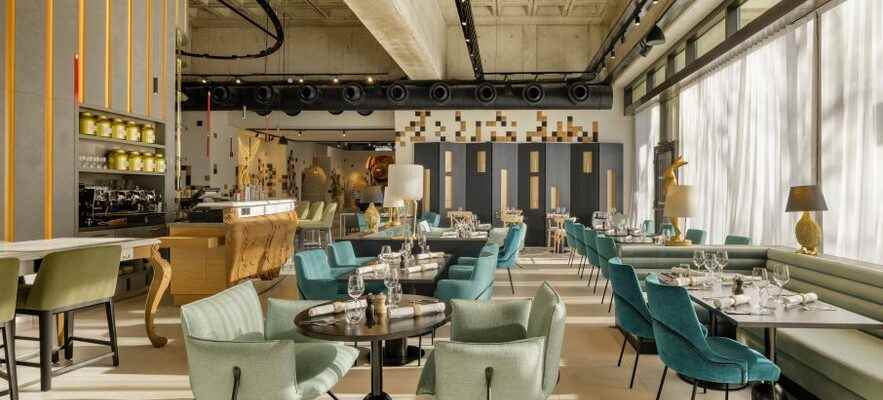Paris, 13th arrondissement. On this Monday evening in January, the dining room of the TOO Hotel is full. Business tourists, couples, group of friends, colleagues… All have made an appointment. For a major event? No. Since its opening at the end of October, the TOO Restaurant – with its 140 seats – has never been empty. “We are full for lunch and dinner,” assures us Cécile Sandral, director of communication for the establishment. It must be said that the panorama is unique.
Perched on the 25th floor of one of Jean Nouvel’s Duo Towers, the TOO Restaurant is nestled in a glass cube offering an unprecedented view of all of Paris, above the hotel of the same name. On the plate? The Japanese flavors of the menu signed Benjamin Six are also up to par.
“We are targeting a population of young connected workers who work in banks, entertainment, tech…, a generation that goes fast and wants nice places to work, explained Laurent Taïeb, creator of the place, during of the site visit in October. In this area, the City of Paris has been able to mix homes as well as offices and shops”. And soon a university, that of Chicago, at the foot of the tower, which is scheduled to open later this year. After the success of Madame Rêve opened a year earlier, the Parisian businessman and hotelier seems to have succeeded in his bet: bringing together business and leisure customers and enlivening part of eastern Paris.
“Revitalize existing real estate to create places to live”
The First Name hotel, which opened on January 11, 2023, is housed in a former office building, designed by architect Louis Arretche, in Mériadeck, opposite the Jardins de la mairie de Bordeaux.
© / Jerome Galland
Revalue and animate a district through a hotel establishment? This is also the ambition of FirstName (Alboran group), a new brand integrated into the Joie de Vivre (JdV) network developed by Hyatt. For the first location, the three partners – Jérôme Bosc, Eric Omgba and Yann Caillère – chose Bordeaux. The hotel, which opened on January 11, 2023, is housed in a former office building, designed by architect Louis Arretche, in Mériadeck, opposite the town hall gardens. “We want to revive existing real estate to create places to live and promote the local economic fabric”, says Jérôme Bosc. How ? Through three main axes: music, with a rich program, including DJ sets and concerts; gastronomy, with a wine and cocktail bar, a restaurant, as well as a hidden bar; and finally art, with the exhibition of works by regional designers, in particular.
The founders also rely on the local ecosystem for most of the hotel’s products. In the rooms, the cosmetics are signed Oceopin, while the cuisine of starred chef Cédric Béchade is resolutely locavore; all on the basis of environmental awareness. Eric Omgba adds: “Throughout the course of the establishment, we offer winks to the history of the city.” Objective: to become a place of destination for travelers as well as for Bordeaux residents. And to discover – or rediscover – the city. “This hotel is significant because it is located in an area built in the early 70s, right in the city center. It is very interesting to reinvest this type of building whose architecture has been somewhat shunned for many years. This anchors neighborhood life,” says Olivier Occelli, general manager of the Bordeaux Métropole Tourist and Convention Bureau.
At the heart of a local dynamic
“The renovations, rehabilitations and openings of hotels are really part of a new, very local dynamic, of short circuit, anchored in the DNA of the city’s destination, notes Olivier Occelli. This is what makes it possible to attract both visitors and locals. Another example: the rehabilitation of the wet docks, in the Bacalan district, at the other end of the city: near the Cité du Vin, new hotels (Renaissance, Moxy, etc.) equipped with restaurants and bars make it possible to drain local customers. Camille Rives, head of tourist real estate investment at the Banque des Territoires (Caisse des dépôts group) observes: “The accommodation offers are becoming real places of entertainment for tourists and for the inhabitants of the sector”. The reason ? “People today are looking for an experience, a sensation, explains Marc Thépot, president of the Marseille Convention and Visitors Bureau. Owner of the Nhow, a 4-star hotel located 3 km from the Vélodrome and 2. 4 km from La Corniche, this professional in the sector verifies it in his establishment: “Catering and events represent 40% of turnover”.
And when these places also benefit from a view or a roof terrace, the cocktail is a winner. Also in Marseille, the Banque des Territoires has thus supported the Babel Community on the Old Port, a co-living place with a roof terrace and a very beautiful view of the cathedral: “It is a place where the people of Marseille get together to have a good time.” The panorama is also the strength of the Seaside in Marseille. “It has become a meeting place, assures Frédéric Biousse, owner of the hotel with Guillaume Foucher. And to add: 75% of our restaurant and bar customers are from Marseille”.

Opposite the Cercle des Nageurs, in Marseille, the Hotel des Bords de Mer has participated in the revival of the Catalans district.
© / wearecontents
According to the creators of the Domaines de Fontenille – a unique collection of luxury houses – the hotel les Bords de Mer has also participated in the revival of the Catalans district. “The city wants to clean up the whole area, redo the seaside structures…, explains Guillaume Foucher. The renovation of the Seaside came at a time when the metropolis built the cycle path that starts from the Old Port to go to Les Goudes The hotel has revived the dynamism of the beach”. Enhanced by the works and its regular pedestrianization, the cornice attracts hoteliers. Next opening: Le Péron, after several months of renovation…
Other districts of Marseille are concerned: “The arrival of the Olympic Games and the Rugby World Cup are a real opportunity. This will revitalize another part of the city which was somewhat neglected, such as Borely and the Parc Chanot, rejoices Marc Thépot. There are projects in the air with living spaces in which catering and events will take an important part. With its 54 km of coastline, the city is a balcony on the sea . It’s a real advantage.”
Hotels, spearheads of new neighborhoods
“We support local authorities and tourist operators to establish themselves through the creation or renovation of offers in all types of territories. However, this criterion of animation and establishment is extremely important because we are very sensitive to local development. “, adds Camille Rives. And to continue: “The establishment of a hotel makes it possible to pull up and animate an entire district and also to launch a phase of renovation”. This is also the axis taken today by the firm Pitaya, creator of hotel concepts: “We very much assimilate the policies of major works with the social hubs which will create new districts within the cities themselves”, explains Leslie Johns, co-founder. And to refer to Meatpacking in New York which has become trendy with the arrival of the Soho House, as well as to Shoreditch in London with the Hoxton: “These landmarks were born in places which were not yet completely gentrified, even still infamous”.
In France, the trend was born with the Mama Shelter in 2008 – which has since spread in France and internationally – and with MOB Hotel, in Saint-Ouen: “They were upstream of a policy of major works”, recalls Leslie Johns. On the program: allotments, open-air cinema, conferences, concerts, etc. close to the Puces. “The idea was born in Brooklyn, in 2008, in Boerum Hill”, says Cyril Aouizerate, owner of MOB which has since developed in Lyon and soon in Bordeaux, Los Angeles and Washington. “The style of our house is to live in harmony with the history and sociology of the location”.
Inner-city migration… and job creation
“It is a trend that is accelerating and that we are also accelerating through our investments. There is a real desire to focus the migration of city centers and that is also why hoteliers need to open up to the neighbourhoods”, remarks Camille Rives. And to cite as an example the investment in the Eklo hotel located in the cartoucherie area, in Toulouse, a booming sector with gourmet halls, the opening of a Shanga Hotel scheduled for 2024… “We are thus participating to the revitalization of a district which also becomes a real place of life for its inhabitants”. Another example: Porte de Versailles, in Paris. “The arrival of hotels like Okko, Mama Shelter or Novotel helped to pacify this area and make it more attractive for workers and locals. They became gathering places in a part of the city that was rather aggressive “, remarks Leslie Johns, whose firm has worked in particular on the Grand Quartier in the 10th arrondissement of Paris, thought of “as a social hub in the heart of the city”, or on the next Bloom House, near the Gare de l ‘Est, which is scheduled to open in the first half of 2023: “We have designed this establishment as a very green bubble in an area undergoing slow gentrification”.
Big cities aren’t the only ones affected. In Limoges, for example, the Gogaille brand deconstructs the traditional hotel industry with an accommodation offer in the city center backed by a shop, a bakery, a caterer, a bar, a restaurant area with local products and house… but also multiple events: DJ evenings, workshops, tastings, theme evenings. After a second location in Tours, two other openings are planned in Orléans and Poitiers in 2023.
“A city becomes trendy and attractive when hotels grow, when new brands arrive”, insists Leslie Johns. And that’s without taking into account the socio-economic impact: “The arrival of a hotel always creates jobs that cannot be relocated to the territory. It is a quantitative criterion that we observe at each opening”, affirms Camille Rives. Marc Thépot notes this in Marseille: “I think there are approximately more than 20,000 jobs linked to the hotel industry and 90% of the workforce is from the area”. Not to mention the tourist tax: “This allows the Tourist Office to work for the inhabitants, for the animation of the city…” And to reconcile tourists and locals. A virtuous circle!
